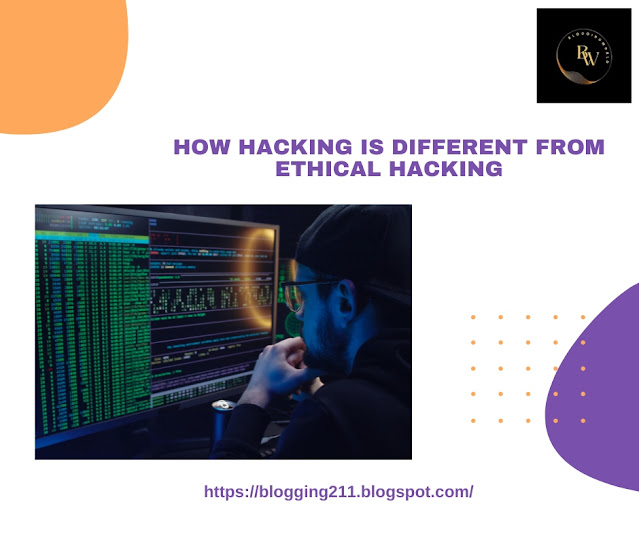In today's digital age, hacking has become a major concern for individuals, businesses, and governments worldwide. While the term "hacking" often carries negative connotations, it is important to understand that there are different types of hacking, including white hat hacking, black hat hacking, and gray hat hacking.
On the other hand, ethical hacking is a type of hacking that involves legally and ethically finding and exploiting vulnerabilities in computer systems, networks, or applications to prevent malicious attacks. In this article, we will discuss how hacking is different from ethical hacking and explore various topics related to ethical hacking, such as ethical hacking courses, certifications, salaries, and growth hacking.
What is Hacking?
Hacking refers to the unauthorized access to computer systems, networks, or applications for malicious purposes. Black hat hackers use hacking techniques to steal personal data, money, or other valuable information from individuals, businesses, or governments. On the other hand, gray hat hackers are a combination of black hat and white hat hackers. They may use hacking techniques for personal gain but also try to expose security vulnerabilities to help improve security.
White hat hackers, also known as ethical hackers, are cybersecurity professionals who use hacking techniques to identify and fix security vulnerabilities in computer systems, networks, or applications. They work for organizations to help secure their systems and prevent malicious attacks.
What is Ethical Hacking?
Ethical hacking is a legal and ethical way of hacking computer systems, networks, or applications to identify and fix security vulnerabilities. It is also known as penetration testing or pen testing. The main purpose of ethical hacking is to prevent malicious attacks by identifying vulnerabilities and providing solutions to fix them.
Ethical hacking involves using various hacking techniques such as social engineering, penetration testing, and vulnerability scanning. Ethical hackers are usually hired by organizations to test their security systems and provide recommendations to improve them.
How Hacking is Different from Ethical Hacking
The main difference between hacking and ethical hacking is the intent behind the act. Hacking is illegal and is done with the intent to gain unauthorized access to a system, steal information, or cause damage. Ethical hacking, on the other hand, is done legally and with the intent to identify vulnerabilities and fix them.
Hacking carries severe consequences, including legal penalties, fines, and even imprisonment. Ethical hacking, on the other hand, is a legal and ethical way of hacking that helps organizations identify security vulnerabilities and improve their security posture.
Ethical Hacking Course and Certification
To become an ethical hacker, one needs to have extensive knowledge of computer systems, networks, and applications. Ethical hacking courses are designed to provide individuals with the necessary knowledge and skills to identify and fix security vulnerabilities.
There are various ethical hacking courses and certifications available, such as Certified Ethical Hacker (CEH), Certified Information Systems Security Professional (CISSP), and Offensive Security Certified Professional (OSCP). These certifications are highly regarded in the cybersecurity industry and can help individuals advance their careers in ethical hacking.
Ethical Hacking Salary
Ethical hacking is a highly lucrative career path in the cybersecurity industry. According to PayScale, the average salary for an ethical hacker is $81,834 per year in the United States. The salary varies based on factors such as experience, location, and certifications.
Compared to other cybersecurity positions, ethical hacking salaries are on the higher end. For instance, the average salary for a cybersecurity analyst is $76,410 per year, according to PayScale.
Growth Hacking and Fake Hacking Websites
Growth hacking is a marketing technique that involves using innovative and creative strategies to grow a business rapidly. While growth hacking may involve some ethical hacking techniques, such as identifying and fixing security vulnerabilities, it is not the same as ethical hacking.
Fake hacking websites are websites that claim to offer hacking services or software but are actually scams designed to steal personal information or infect systems with malware. These websites can be very dangerous and should be avoided at all costs.
Conclusion
In conclusion, hacking and ethical hacking are two different things with different intents and consequences. Hacking is illegal and done with the intent to gain unauthorized access or cause harm, while ethical hacking is legal and done with the intent to identify vulnerabilities and improve security.
Ethical hacking is a lucrative career path in the cybersecurity industry, and there are various courses and certifications available to help individuals gain the necessary knowledge and skills. It is important to avoid fake hacking websites and understand the differences between different types of hacking to protect oneself and one's business.








0 Comments